Coronavirus: Two million Bangladesh jobs 'at risk' as clothes orders dry up
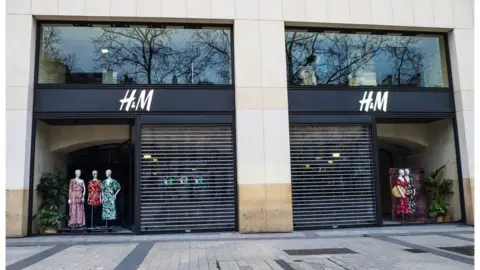 Edward Berthelot
Edward BerthelotHigh Street fashion emporiums around the world have closed their doors for lockdowns, but the largely forgotten victims are thousands of miles from the glass and steel-fronted shopping arcades.
Sabina Akhter is one of them. She works in a garment factory on the outskirts of Dhaka in Bangladesh making shirts for the European market.
A few days ago, her boss announced he would not be able to keep the factory running as all his buyers in Europe have cancelled their orders due to the coronavirus outbreak.
"I don't know how I'll be able to survive. I lost my job, and I don't know how I'll be able to buy food," she said.
Anisa Begum has also been laid off. She is at home with her family of seven on the outskirts of Dhaka.
She says she and her husband could survive on one meal a day, but not with children. "If the government doesn't come forward with help, we have no way to survive."
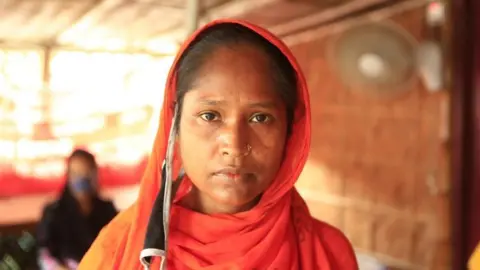 Salman Saeed
Salman SaeedKhaleda Parvin says the owner of the factory where she worked decided to lay off everyone without warning.
"I went home to my village because it was a national holiday," Khaleda said.
"Our factory was supposed to reopen on the 5th of April. When I went back to work on that day, someone had put up a sign saying that all the workers had been laid off."
A risky reliance
Bangladesh is the top garment exporter in the world after China and is heavily reliant on European and American orders.
Some 83% of the revenue that Bangladesh makes through exports are linked to the garment industry, a total of more than $32 billion every year.
The sector employs more than four million workers, most of them women.
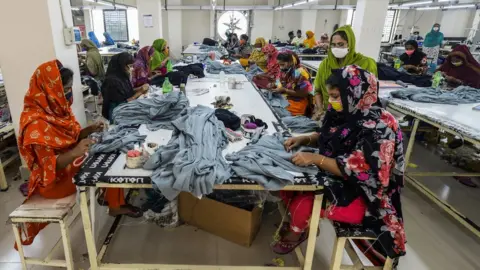 MUNIR UZ ZAMAN
MUNIR UZ ZAMANWith shops shut across large parts of Europe and the United States, global retail brands have taken fright and cancelled orders worth more than $3 billion.
The Bangladeshi government has announced a $588 million stimulus package for the sector to pay wages.
It will charge 2% interest on the loan to factory owners.
Dividing the sum by the number of workers, this financial package would only cover wages for one month.
If factories remain shut, Anisa, Khalida and Sabina know they have no social safety net to fall back on.
Driving a hard bargain
Human Rights Watch has condemned the attitude of some Western clothing brands.
It accused scores of retailers of cancelling orders without taking any financial or moral responsibility, even though workers had finished making many of the products.
After growing criticism and pressure, some brands including H&M and Zara-owner Inditex have committed to paying in full for existing orders from clothing manufacturers.
But order cancellations are having a devastating impact on businesses and workers, according to a recent survey by the Centre for Global Workers' Rights.
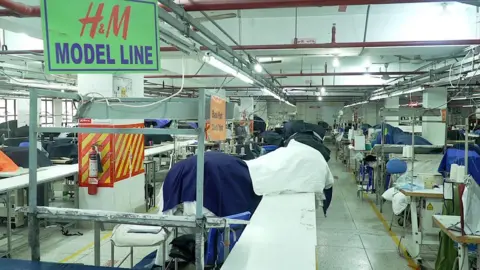
The study said that when orders were cancelled, 72.1% of buyers refused to pay for raw materials (fabric, etc) already purchased by the supplier, and 91.3% of buyers refused to pay for the "cut-make-trim" cost - or production cost - of the supplier.
As a result, 58% of factories surveyed reported having to shut down most or all of their operations.
"More than two million garment factory workers might lose their jobs," Rubana Huq, president of Bangladesh Garment Manufacturers and Exporters Association (BGMEA), has warned.
"No consumer will buy shirts and trousers now. They are more focused on increasing their expenditure on food and medicine due to the pandemic," she said.
Global solutions?
After the Rana Plaza factory collapse in 2013 which killed more than 1,000 workers, global efforts to raise safety standards were successful, as well as making supply chains more transparent.
But there is still a long way to go in a global fashion industry which records annual revenues of $2.5 trillion while the average worker in Bangladesh earns just over $100 a month.
The International Labour Organization, a UN body, has set up a working group bringing together retailers, factory owners and workers to try and find a solution to the current crisis.
"Jobs, incomes and social protection are the dividends of business continuity and this statement calls for emergency funds and social protection for workers to guarantee industry survival in the poorest of our countries," said International Trade Union Congress (ITUC) Sharan Burrow in a statement.
Both Inditex and H&M are committed to this process.
"We are fulfilling all our responsibilities to our suppliers by ensuring that all orders that have been produced or are currently in production are completely paid for according to the original payment terms," said Zara-owned Inditex in a statement.
H&M said it would "stand by" its commitments to garment manufacturing suppliers in all countries "by taking delivery of already produced garments as well as goods in production, if delivered within a reasonable timeframe".
But time and speed is of the essence for factory owners in Bangladesh.
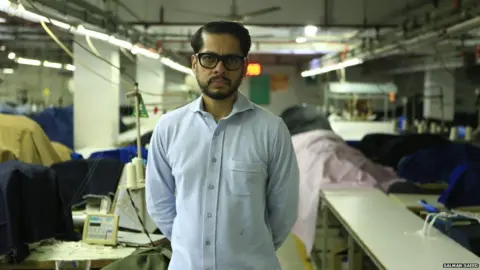 Salman Saeed
Salman SaeedMiran Ali is the managing director of Misami Garments Ltd. His factory makes clothes for H&M and has been in operation since 1991.
"We are facing massive financial difficulty," he says. "We are facing almost certain ruin."
He employs about 16,000 workers. He would like to re-open soon but social distancing will be hard when people normally work very closely together.
'Full of fear'
Bangladesh has been under lockdown since 26 March when transport was shut down and businesses closed.
As of Tuesday, 28 April, there were 6,462 confirmed cases of coronavirus and 155 deaths.
The garment industry was given an exemption from the lockdown.
While some factories stayed open to make PPE, it is now estimated that about 200,000 garment workers are back at work.
The sector has been urged to enforce social distancing as well as raise hygiene standards but workers say some factories are ignoring this.
"I'm going to work every day and I'm full of fear," one garment factory worker told the BBC.
"In my factory, there are so many of us working in such a small place, which increases the risk of coronavirus infection. I'm scared for my life."
